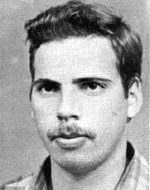Son of Gavriel and Ofra – teachers and farmers. Born on 20.3.1956 in the Kinneret colony, Amir graduated from the Beit Yarach high school in the real track, and Amir became interested in many fields: he was an outstanding swimmer, He learned to play the piano and loved music, and in 1973 he participated in a delegation of young artists who went to Germany for a meeting with German art-loving youth: “I will not forget the moment when Amir plays Chopin’s waltz, ‘Do not look at me for being such a musician, in fact I am a farmer …’ “Indeed, Amir was above all connected to the land and the family farm on the outside of the Sea of Galilee, Eid: “By the way, with regard to Zionism, you know that this is a far greater value than I have now, and I can write a whole book about it.” Amir traveled extensively in Israel, whose landscape and nature he loved so much. Wrote: “Longing for one person is not at all like love for the land, longing for home, for the land, for the air, for the air, for friends and for society, for culture, for language, or as the poets write: For the addict! On the phone, with a house made of stone and cement? … “In March 1974, Amir volunteered for the air force and immediately upon his enlistment he joined a pilot course. In July 1975 he went with the Israeli delegation to the United States, as part of the exchange of youth aviation clubs. In November 1975, he was sent abroad to receive part of his training as a helicopter pilot, and he was very proud of being a pilot and was very sensitive to the social problems in the country and believed that they could only be solved by education. “If we change the people from the bottom, the people will also change, and if the people from below are better, there will be better people in the top,” he wrote, noting that during the months he served in his unit, Amir, a dedicated and thorough officer, who fulfilled his task diligently and with Zionist zeal, and in a short period of time managed to become fond of his friends and commanders, The unit and its activities, he embodied in his character, as his commander points out, a deeply rooted Israeli person who loves people: “An officer is not only a rank, it is something above the level, An officer gets a lot of authority, but in many cases he does not know how to use them correctly, a commander is a figure, a relation to the subordinates, and finally an authority – a commander who fulfills his duties with the power of his own hand, fails – more important than all his other functions is the proper and understandable operation of the commanders , And the esteem that the clerks appreciate. Everything else is marginal. And in fact, everything else, just, gets on with it. “Without knowing what was in store for him, Amir wrote about the death:” To live for no reason is no better than dying without a reason. And when there is a reason – both are equal. When Trumpeldor said his famous trial, he must have meant it. He certainly did not think that ‘it was good to die …’ but because of the reason: ‘For our country’. Each and every one of them has their own reasons… Everyone loses, at some stage, in his game against the Angel of Death… If he has a good reason for this eulogy – he is Simcha, death is not so terrible. Unfortunately, there are many people who continue in the game, and they lack the one who lost … “On May 10, 1977, Amir fell in his role as a helicopter crash in the Jordan Valley, killing 54 soldiers. In the cemetery in the Sea of Galilee he left behind his parents, brother and sister, and was promoted to lieutenant.
